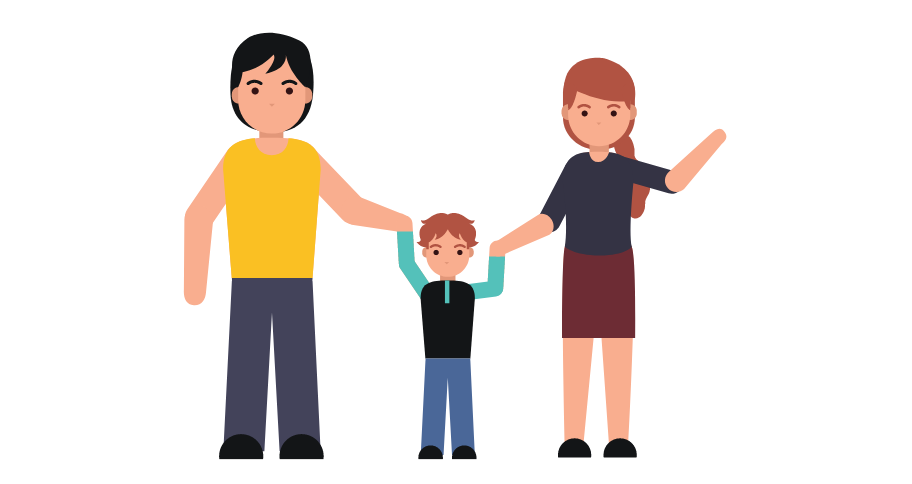20 Discipline Tactics for Toddlers
Juhika Mehta |
Social Skills |
2023-09-05 |
9 mins read

Table of Contents
Admissions Open for
Introduction
How exactly does one “discipline” a toddler? Some people equate it with spanking and punishment but that’s not what we’re talking about. As many parenting experts see it, discipline is about setting rules. It is to stop your little one from engaging in behavior that’s aggressive (hitting and biting), dangerous (running out in the street), and inappropriate (throwing food).
For many mothers, doling out effective discipline’s one of the toughest and most frustrating tasks of parenting. A seemingly never-ending test of wills between you and your child. This is Because she’ll latch on to another bothersome behavior —and the process starts anew.
20 Toddlers Discipline Tactics
This tactics can help you set limits and stop bad behavior of your toddlers. Take notes!
1. Pick Your Battles

If you’re always saying, ‘No’ your child will tune out the no. She/He won’t understand your priorities, says Pearson, author of The Discipline Miracle. “Plus you can’t possibly follow through on all of the nos.” Define what’s important to you, set limits accordingly, and follow through with appropriate consequences. Then ease up on little things that are annoying but otherwise fall into the “who cares?” category—the habits your child is likely to outgrow, such as insisting on wearing purple (and only purple).
Keeping a good relationship with your child is rather good. Trying to force her to respond in ways that she simply is not going to respond,
2. Know Your Child’s Triggers
Some misbehavior is preventable—as long as you can anticipate what will spark it and you create a game plan in advance, such as removing tangible temptations. If your 18-month-old is prone to grabbing cans off grocery store shelves, bring toys for him to play within the cart while you’re shopping.
If your 2-year-old won’t share her stuffed animals during playdates at home, remove them from the designated play area before her pal arrives. And if your 3-year-old likes to draw on the walls, stash the crayons in an out-of-reach drawer and don’t let him color without supervision.
3. Practice Prevention
Some children act out when they’re hungry, overtired, or frustrated from being cooped up inside, says Harvey Karp, M.D., creator of the DVD and book The Happiest Toddler on the Block. If your child tends to be happy and energetic in the morning but is tired and grumpy after lunch, schedule trips to the store and visits to the doctor for when she’s at her best. Prepare her for any new experiences, and explain how you expect her to act.

Also, prepare her for shifting activities: “In a few minutes we’ll need to pick up the toys and get ready to go home.” The better prepared a child feels, the less likely she is to make a fuss.
4. Be Consistent
Between the ages of 2 and 3, children are working hard to understand how their behavior impacts the people around them. If your reaction to a situation keeps changing—one day you let your son throw a ball in the house and the next you don’t—you’ll confuse him with mixed signals.
There’s no timetable as to how many incidents and reprimands it will take before your child stops certain misbehavior. But if you always respond the same way, he’ll probably learn his lesson after four or five times.
5. Don’t Get Emotional
Sure, it’s hard to stay calm when your 18-month-old yanks the dog’s tail or your 3-year-old refuses to brush his teeth for the gazillionth night in a row. But if you scream in anger, the message you’re trying to send will get lost and the situation will escalate, fast.

“When a child is flooded with a parent’s negative mood, he’ll see the emotion and won’t hear what you’re saying”. Indeed, an angry reaction will only enhance the entertainment value for your child, so resist the urge to raise your voice. Take a deep breath, count to three, and get down to your child’s eye level. Be fast and firm, serious and stern when you deliver the reprimand. Trade in the goal of controlling your child” for the goal of controlling the situation, this may mean re-adjusting your ideas of what is possible for a time until your daughter’s self-discipline has a chance to grow a little more
You may need to lower your expectations of her patience and her self-control somewhat. If your goal is to keep the day going along smoothly, so that there are fewer opportunities for you both to feel frustrated, that would be a constructive direction.
6. Listen and Repeat
Kids feel better when they know they have been heard, so whenever possible, repeat your child’s concerns. If she’s whining in the grocery store because you won’t let her open the cookies, say something like: “It sounds like you’re mad at me because I won’t let you open the cookies until we get home. I’m sorry you feel that way, but the store won’t let us open things until they’re paid for. That’s its policy.” This won’t satisfy her urge, but it will reduce her anger and defuse the conflict.
7. Keep It Short and Simple
If you’re like most first-time parents, you tend to reason with your child when she breaks rules, offering detailed explanations about what she did wrong and issuing detailed threats about the privileges she’ll lose if she doesn’t stop misbehaving. But as a discipline strategy, overt-talking is as ineffective as becoming overly emotional.
While an 18-month-old lacks the cognitive ability to understand complex sentences, a 2- or 3-year-old with more developed language skills still lacks the attention span to absorb what you’re saying.
Instead, speak in short phrases, repeating them a few times and incorporating vocal inflections and facial expressions. For example, if your 18-month-old swats your arm, say, “No, Rohan! Don’t hit Mommy! That hurts! No hitting.” A 2-year-old can comprehend a bit more: “Evan, no jumping on the sofa! No jumping. Jumping is dangerous—you could fall. No jumping!”
8. Offer Choices
When a child refuses to do (or stop doing) something, the real issue is usually control: You’ve got it; she wants it. So, whenever possible, give your preschooler some control by offering a limited set of choices. Rather than commanding her to clean up her room, ask her, “Which would you like to pick up first, your books or your blocks?” Be sure the choices are limited, specific, and acceptable to you, however. “Where do you want to start?” may be overwhelming to your child, and a choice that’s not acceptable to you will only amplify the conflict.
9. Watch Your Words
It helps to turn “you” statements into “I” messages. Instead of saying, “You’re so selfish that you won’t even share your toys with your best friend,” try “I like it better when I see kids sharing their toys.” Another good technique is to focus on do’s rather than don’ts. If you tell a 3-year-old that he can’t leave his trike in the hallway, he may want to argue. A better approach: “If you move your trike out to the porch, it won’t get kicked and scratched so much.”
Make sure your tone and words do not imply that you no longer love your child. “I really can’t stand it when you act like that” sounds final; “I don’t like it when you try to pull cans from the store shelves,” however, it shows your child that it’s one specific behavior—not the whole person—that you dislike.
10. Teach Empathy
It’s rarely obvious to a 3-year-old why he should stop doing something he finds fun, like biting, hitting, or grabbing toys from other children. Teach him empathy instead: “When you bite or hit people, it hurts them”; “When you grab toys away from other kids, they feel sad because they still want to play with those toys.” This helps your child see that his behavior directly affects other people and trains him to think about consequences first.
11. Give a Time-Out
If repeated reprimands, redirection, and loss of privileges haven’t cured your child of her offending behavior, consider putting her in time-out for a minute per year of age. “This is an excellent discipline tool for kids who are doing the big-time no-nos,” Dr. Karp explains.
Before imposing a time-out, put a serious look on your face and give a warning in a stern tone of voice (“I’m counting to three, and if you don’t stop, you’re going to time-out. One, two, THREE!”). If she doesn’t listen, take her to the quiet and safe spot you’ve designated for time-outs, and set a timer. When it goes off, ask her to apologize and give her a big hug to convey that you’re not angry.
12. Talk Options
When you want your child to stop doing something, offer alternative ways for him to express his feelings: say, hitting a pillow or banging with a toy hammer. He needs to learn that while his emotions and impulses are acceptable, certain ways of expressing them are not. Also, encourage your child to think up his own options. Even 3-year-olds can learn to solve problems themselves. For instance, you could ask: “What do you think you could do to get Tiffany to share that toy with you?” The trick is to listen to their ideas with an open mind. Don’t shoot down anything, but do talk about the consequences before a decision is made.
13. Reward Good Behavior
It’s highly unlikely that your child will always do whatever you say. If that happened, you’d have to think about what might be wrong with her! Normal kids resist control, and they know when you’re asking them to do something they don’t want to do. They then feel justified in resisting you. In cases in which they do behave appropriately, a prize is like a spoonful of sugar: It helps the medicine go down.
Judicious use of special treats and prizes is just one more way to show your child you’re aware and respectful of his feelings. This, more than anything, gives credibility to your discipline demands.
14. Stay Positive
No matter how frustrated you feel about your child’s misbehavior, don’t vent about it in front of him. “If people heard their boss at work say, ‘I don’t know what to do with my employees. They run the company, and I feel powerless to do anything about it,’ they’d lose respect for him and run the place even more,” says Pearson. “It’s the same thing when children hear their parents speak about them in a hopeless or negative way. They won’t have a good image of you as their boss, and they’ll end up repeating the behavior.”
Still, it’s perfectly normal to feel exasperated from time to time. If you reach that point, turn to your spouse, your pediatrician, or a trusted friend for support and advice.

15. Expect demands for attention
When I am not focused on Violet, that is when she acts up the most. If you need to cook a meal, take an important phone call, or do anything that can take your eyes away from your little one for a decent length of time, provide some entertainment. Pop her in the high chair with a snack or put on her favorite YouTube singing channel, Super Simple Songs, so she can belt out “Daddy Finger.”
If you don’t provide something to do for your toddler when you’re busy, she’ll find something to entertain herself – in the worst way. Like, pulling off her dirty diaper and wiping the poo on the couch.
16. Acknowledge good behavior
When your child behaves well, praise them. When they clean up their mess without being asked, praise them. When they say please and thank you to their elders, praise them. When they get dressed and ready on time, praise them.
When you give your kid kudos when she behaves well, she’ll do these things more, and be less likely to act like crabby pants to snag your attention.
17. Use humor
I truly believe humor solves almost everything. It makes you laugh and can distract you from less than stellar situations. When your child is acting a fool and your eye is about to twitch, throw them a curveball. Say something absurd or throw them off with a wrong name.
Like, when your daughter is having a meltdown because it is time to get out of the bath, tell her Farty the Grouch (or some other tweak of her favorite character, family member, or friend) is waiting to play with her. She will laugh and be like, no mama, it’s Oscar. You can create a game out of it. The sillier the better. And, when she does make it out of the tub, click “Farty the Grouch” open on her iPad, so she can have a quick visit to Sesame Street.
18. Use a naughty chair
Give your child a time out in the naughty chair or whatever you want to call it, but first, take them to a quiet spot away from shenanigans. The CDC recommends giving 1 minute of time-out for every year of the child’s age. So, a 2-year-old would sit in time-out for 2 minutes, and a 4-year-old would have a 4-minute time-out.
Do not talk to your child, look at your child, or touch your child when they’re in time out. Make sure siblings or another person in the room (ahem, Grandma) are not giving the child attention in time-out. You’d be surprised how frustrating it is for kids when attention is taken away from them. It will help them learn to make better choices in the future.
19. Hold the punishment
Discipline and punishment are not the same things. Discipline is the “practice of training someone to behave in accordance with rules or a code of behavior.” Punishment is to “inflict suffering for the past behavior.” There are more effective tactics to discipline your child other than spanking. Even if it happened to you as a child, and you turned out okay, it doesn’t make it right. It’s not okay to hit your child, then get angry when they respond to others in the same way. If your toddler is acting out, and you feel like your going to lose your cool, take a mommy time out to stay calm.
20. Tell your kiddo that you love her
I’m sure the reasons you are disciplining your child are because you care about her, you want to make sure she grows into a young respectable human being, and you love her. So, don’t forget to tell her. I always end a discipline discussion with an “I love you” or other positive reinforcement. This act displays to your child to move on and not dwell on the issue at hand. It also shows the real reason why you’re establishing limits — because you love her!
Conclusion
Discipline comes with time when you are able to understand your toddlers behavior better. It is a way to educate toddlers based on mutual respect, affection and understanding, which favors the emotional development of children, and strengthens emotional bonds between parents and children.
Tell us how you deal with your toddler in the comments below!
Also Read:
CBSE Schools In Popular Cities
- CBSE Schools in Bangalore
- CBSE Schools in Mumbai
- CBSE Schools in Pune
- CBSE Schools in Hyderabad
- CBSE Schools in Chennai
- CBSE Schools in Gurgaon
- CBSE Schools in Kolkata
- CBSE Schools in Indore
- CBSE Schools in Sonipat
- CBSE Schools in Delhi
- CBSE Schools in Rohtak
- CBSE Schools in Bhopal
- CBSE Schools in Aurangabad
- CBSE Schools in Jabalpur
- CBSE Schools in Jaipur
- CBSE Schools in Jodhpur
- CBSE Schools in Nagpur
- CBSE Schools in Ahmednagar
- CBSE School In Tumkur

Call Us to know more about Orchids
Swipe Up

















